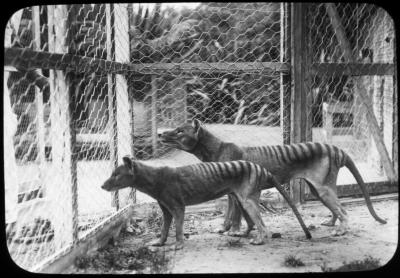Scientists say ‘pickled’ fossil could help bring back extinct Australian marsupial
Breakthrough has potential to revolutionise wildlife conservation
Your support helps us to tell the story
From reproductive rights to climate change to Big Tech, The Independent is on the ground when the story is developing. Whether it's investigating the financials of Elon Musk's pro-Trump PAC or producing our latest documentary, 'The A Word', which shines a light on the American women fighting for reproductive rights, we know how important it is to parse out the facts from the messaging.
At such a critical moment in US history, we need reporters on the ground. Your donation allows us to keep sending journalists to speak to both sides of the story.
The Independent is trusted by Americans across the entire political spectrum. And unlike many other quality news outlets, we choose not to lock Americans out of our reporting and analysis with paywalls. We believe quality journalism should be available to everyone, paid for by those who can afford it.
Your support makes all the difference.Breakthrough reconstruction of almost the complete genome of the Tasmanian tiger from a pickled fossil skull could help bring the extinct species back to life, scientists claim.
The creation of the “highest quality” genome of the iconic thylacine, a marsupial native to Australia, was announced on Wednesday by Colossal, which describes itself as a species preservation company.
Colossal says the research could also boost efforts to combat the ongoing extinction crisis in the world.
The Tasmanian tiger, a cornerstone species vital to the Tasmanian ecosystem, was hunted to extinction at the turn of the 20th century. Its relatively recent extinction, however, means the marsupial’s well-preserved specimens are available for research.

Ancient fossil specimens generally only retain short DNA sequences and little to no RNA due to degradation after an animal dies.
The 110-year-old thylacine specimen, however, contained long DNA sequences. Colossal says it could also isolate RNA from soft tissues of the complete thylacine head specimen, skinned and preserved in ethanol.
The samples used to reconstruct the animal’s genome are among the “best preserved ancient specimens”, evolutionary biologist and Colossal’s chief science officer Beth Shapiro says.
This “pickled” specimen of the Tasmanian tiger, Colossal researchers say, enabled them to rebuild a 99.9 per cent accurate genome of the species, making it the most complete ancient genome of any species known to date.
The results are yet to be published in a peer-reviewed study.

The breakthrough has the potential to revolutionise wildlife conservation and offer insights into other “de-extinction projects” such as those of the woolly mammoth, Dr Shapiro says.
“We have delivered a record-breaking ancient genome that will accelerate our thylacine de-extinction project,” Dr Shapiro says.
The thylacine’s biggest fan @ForrestGalante explains how and why we’re bringing back the thylacine 🐅 pic.twitter.com/gtaApT4SyX
— Colossal Biosciences® (@colossal) October 16, 2024
Scientists say they could identify key regions of the thylacine genome contributing to its distinctive skull and jaw shape. In further research, they hope to better understand the pattern of the activation of thylacine genes and how they contributed to its various traits.
Such research could help provide clues to how the extinct marsupial sensed its world and even how its brain functioned, scientists say.
“We’re in the best place ever to rebuild this species using the most thorough genome resources,” says Colossal researcher Andrew Pask from the University of Melbourne.
Some scientists, though, are advising caution about Colossal’s announcement.
Kristofer Helgen, chief scientist at Australian Museums Research, welcomed the advance in genome reconstruction but told ABC News such announcements must come alongside peer-reviewed studies.
Join our commenting forum
Join thought-provoking conversations, follow other Independent readers and see their replies
Comments